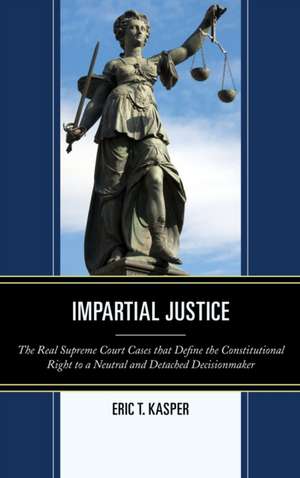Impartial Justice
Autor Eric T. Kasperen Limba Engleză Paperback – 30 apr 2017
Preț: 448.56 lei
Nou
Puncte Express: 673
Preț estimativ în valută:
85.84€ • 88.69$ • 71.40£
85.84€ • 88.69$ • 71.40£
Carte tipărită la comandă
Livrare economică 19 martie-02 aprilie
Preluare comenzi: 021 569.72.76
Specificații
ISBN-13: 9781498556668
ISBN-10: 1498556663
Pagini: 232
Dimensiuni: 149 x 231 x 17 mm
Greutate: 0.36 kg
Editura: Lexington Books
ISBN-10: 1498556663
Pagini: 232
Dimensiuni: 149 x 231 x 17 mm
Greutate: 0.36 kg
Editura: Lexington Books
Cuprins
Acknowledgements
Preface
Introduction: A Short History of What It Means to Be a Neutral, Impartial, and Unbiased Decisionmaker
Part One: An Impartial Jury Trial in Criminal Cases
1. Prejudicial Pretrial Publicity: Sheppard v. Maxwell (1966)
2. Avoiding Mob Justice: Frank v. Mangum (1915) and Moore v. Dempsey (1923)
3. Racial Discrimination in Jury Selection: Batson v. Kentucky (1986) and Miller-El v. Dretke (2005)
4. Sex Discrimination in Jury Selection: Hoyt v. Florida (1961) and Taylor v. Louisiana (1975)
5. Death-Qualified Juries: Witherspoon v. Illinois (1968) and Lockhart v. McCree (1986)
Part Two: Due Process and the Right to an Impartial Judge
6. Mayor-Judges with a Financial Stake in the Outcome: Tumey v. Ohio (1927) and Ward v. Village of Monroeville (1972)
7. A Judge Hearing a Contempt Proceeding after Being Vilified by the Defendant: Mayberry v. Pennsylvania (1971)
8. Non-Lawyer Judges: North v. Russell (1976)
9. The Judge Who Was Bribed in Other Cases: Bracy v. Gramley (1997)
10. A Judge Deciding a Case Involving a Major Campaign Supporter: Caperton v. A.T. Massey Coal Co. (2009)
Part Three: Due Process and the Right to an Impartial
Decisionmaker in Quasi-Judicial, Non-Court Settings
11. Parole Revocation: Morrissey v. Brewer (1972)
12. Medical License Review: Withrow v. Larkin (1975)
13. Mental Health Commitments for Juveniles: Parham v. J.R. (1979)
14. Prison Discipline: Edwards v. Balisok (1997)
15. Enemy Combatant Cases: Hamdi v. Rumsfeld (2004)
Conclusions
Catalog of Cases
Bibliography
Index
Notă biografică
Eric T. Kasper is an associate professor of political science for the University of Wisconsin Colleges and serves as the municipal judge in Rice Lake, Wisconsin, where he lives with his wife Julie and their two children, Madison and Jackson. This is his third book, having previously written Don¿t Stop Thinking About the Music: The Politics of Songs and Musicians in Presidential Campaigns (with Benjamin Schoening) and To Secure the Liberty of the People: James Madison¿s Bill of Rights and the Supreme Court¿s Interpretation.
Descriere
This book discusses the Constitutional right to a neutral decisionmaker, focusing on U.S. Supreme Court cases on the Sixth Amendment guarantee to a jury in criminal cases and to the due process requirements of an impartial judge and a neutral decisionmaker in quasi-judicial contexts. The work explores how these rights have evolved, and it critically examines relevant Court cases.
